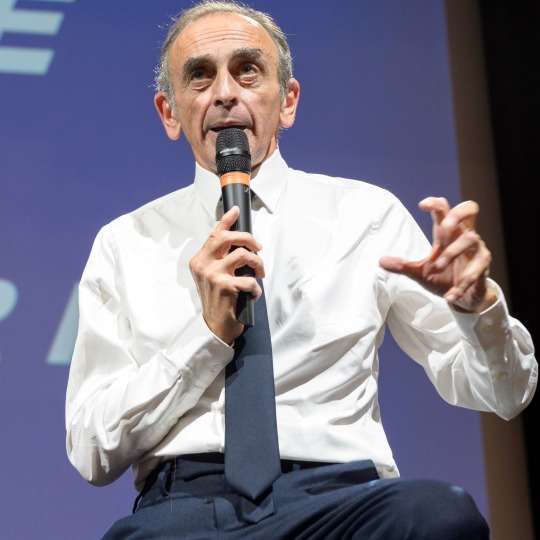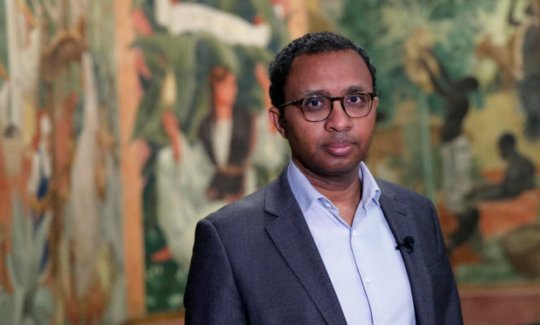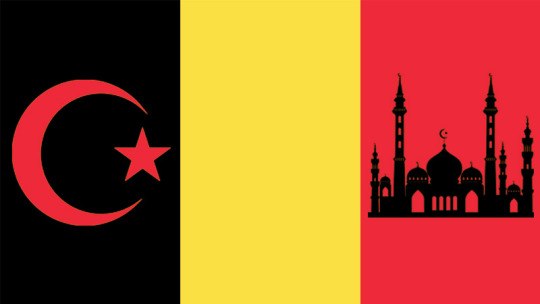#Éric Zemmour
Text

Éric Zemmour
#suitdaddy#suiteddaddy#suit and tie#suited daddy#daddy#men in suits#silverfox#suited men#suitedman#suited man#suitedmen#buisness suit#suited grandpa#suit daddy#jewish daddy#french man#French men#Frenchmen#Éric Zemmour#Eric Zemmour
17 notes
·
View notes
Text

💤 La TV du Z
#ytp#ytpfr#yt people#ytpmv#youtube poop#z#éric zemmour#zemmour#politique#france memes#french memes#french humor#french#peppa pig#spongebob movie game#macron#emmanuel macron#shitpost#goofy#TV#voyage tv#old tv#crt tv#crt monitor#crt television#retro tech#old computers#plankton#z plan#france
1 note
·
View note
Text
Il n'y a jamais eu ni aide musulmane, ni aide noire non musulmane, depuis le début des agressions, meurtres, assassinats, viols, attentats, etc, perpétrés par des arabes et des noirs.
Nulle part et sûrement pas en France. Il n'y a même pas la compassion basique sauf quand on leur tire les vers du nez. Cette compassion est remplacée par de la plainte sur notre "racisme" et notre "islamophobie" pour des refus d'entrée en boîte de nuit parce que les refusés sont habillés en racailles.
Pour un temps peut-être il va y avoir une "réconciliation nationale" toute soralo-dieudonnesque sur le dos des Juifs, entre Arabes et blancs pro-Palestiniens. On a vu si on l'a lu ce qui arrive à Zoé dans Guérilla d'Obertone.
Il faut arrêter de focaliser sur le sujet israélo-palestinien en ce qui concerne l'égotisme de nos invités, d'autant que, comme dit ici vingt fois, le sujet israélo-palestinien est extrêmement spécifique et incomparable au sujet invasions barbares en Occident.
Basile Pesso, 29 octobre 2 023 (Fb)
>>>
'Dans les années 60, le parti communiste italien avait manifesté contre les brigades rouges, violentes, pour dire « pas en notre nom ».
Aujourd’hui, avons-nous vu les communautés musulmanes en Europe manifester pour dénoncer la barbarie du Hamas et le djihad ? Non."
(Eric Zemmour)
#basile pesso#éric zemmour#france#palestine#gaza#israël#sadness#sujets de société#tristesse#contenu original#madness#fight hate#fight male violence#écrivains#écrivains sur tumblr#journalistes#journalisme#journalistes indépendants#yes we are magazine#fight extremism#analystes politiques
0 notes
Text
Zemmour est un enfoiré de haut calibre avec BEAUCOUP trop de défauts pour les 0 qualités qu'il a, mais le plus incompréhensible d'entre eux pour moi est de loin le fait qu'il soutient la République de Vichy et le maréchal Pétain alors qu'il est juif
Je crois qu'il avait tellement la haine de pas avoir pu être un harki pendant la Guerre d'Algérie qu'il a décidé de trahir son peuple d'une toute autre, bien pire manière
0 notes
Text
1 note
·
View note
Text
Au cœur du litige, une sanction prise en mars 2021 par le CSA, devenu l’Arcom, après une diatribe d’Eric Zemmour dans l’émission « Face à l’info », sur les mineurs migrants isolés.
0 notes
Text
France: Les détracteurs de Pap Diaye le tout nouveau ministre de l'enseignement du gouvernement Elizabeth Borne
France: Les détracteurs de Pap Diaye le tout nouveau ministre de l’enseignement du gouvernement Elizabeth Borne
Pap Diaye ministre français de l’enseignement.
L’historien Pap Diaye, né le 25 octobre 1965 à Antony, est un historien et homme politique français, spécialiste d’histoire sociale des États-Unis et des minorités, a été plébiscité par le président Emmanuel Macron et Élisabeth Borne pour diriger la destinée du ministère de l’enseignement sous la conduite de Élisabeth Borne.
À peine nommé à la…

View On WordPress
0 notes
Video
youtube
sondages
#youtube#Éric Zemmour : La vérité sur les sondages par Guillaume Peltier Éric Zemmour sondages presidentielle eric zemmour sondages
0 notes
Text
Éric Zemmour: les vraies raisons de son échec
Éric Zemmour: les vraies raisons de son échec
Qu’on aime ou qu’on déteste l’homme et ses idées, on ne peut rester indifférent à son amour de la France, à la sincérité de ses discours et au dynamisme de sa campagne électorale.
(more…)

View On WordPress
#Éric Zemmour: les vraies raisons de son échec#élections#Eric Zemmour#France#Hervé Azoulay#Observatoire du MENSONGE#politique
0 notes
Text
Grand Remplacement en Europe. La Belgique en voie de submersion
À Bruxelles, une conférence réunissant Nigel Farage, Viktor Orbán et Éric Zemmour a été interdite par Emir Kir, un bourgmestre socialiste proche des radicaux islamistes. L’occasion pour Polémia de diffuser à nouveau cet article aussi édifiant que nécessaire sur l’état désastreux de la Belgique, confrontée à une submersion migratoire terrifiante. Cette analyse publiée en 2019 reste pertinente…

View On WordPress
2 notes
·
View notes
Text
ARBR members must have received the e-mail a few days ago already, but for those who don't know, the administrator of the association and her mother have been violently attacked by a far right Neonazi in their own home. They were beaten up, he threatened to burn their home and kill their dog. This man is the leader of the supremacist action Theuz, a member of l'Action Française in Arras (far-right monarchist political movement), a supporter of Éric Zemmour and Marine Le Pen as well as a fervent royalist. They have been repeatedly threatening the ARBR and its members because of the Robespierre Museum the association aims to open in four years.
This is a striking example of how important Robespierre's and the French Révolution's legacies still are today, and of how deeply, deeply political they are. It's also a good reminder of the true face of the far right and royalists in this country. La France Insoumise, la Ligue des droits de l'Homme, le Parti socialiste and le parti Communiste have all made their support for the ARBR public.
87 notes
·
View notes
Text

Gli antisemiti di oggi non leggono Drumont e Maurras. Leggono il Corano.
Éric Zemmour
2 notes
·
View notes
Text
Quelle que soit sa provenance, cet antisémitisme se passe en France. Je ne vois pas à quoi joue ici Zemmour. Il indique probablement qu'il faut être plus spécifique mais cela fait vingt ans que Finkielkraut and co parlent du "nouvel antisémitisme" sans dire précisément ce que c'est sauf lorsqu'ils développent, par exemple dans des émissions de radio où ils peuvent parler, comme Répliques sur France-Culture.
Il faut cela dit nuancer, et pour cela l'affaire du Gang des barbares (2 006, Wikipédia ici avec la liste des barbares) est signifiante. Il s'agissait d'un gang de 20 personnes environ, de toutes origines, avec pour meneur le noir non musulman Youssouf Fofana. C'est en prison qu'il s'est converti à l'Islam (article du Figaro de 2 016).
Basile Pesso, 30 octobre 2 023 (Fb)
Avec post de Zemmour "Il n'y a pas de montée de l'antisémitisme en France car les Français ne sont pas antisémites (...)"
#basile pesso#éric zemmour#france#contenu original#fight hate#fight extremism#fight antisemitism#israel#palestine#gaza#écrivains#écrivains sur tumblr#journalistes#journalisme#journalistes indépendants#madness#sadness#tristesse#yes we are magazine
0 notes
Text
The French Far Rights, Marine Le Pen sets sail
By Roman Eldin
Breaking NEWS !
It is official, at the 18th congress of the Rassemblement National, Marine Le Pen officially leaves the presidency of the RN on Saturday, November 5, 2022. After 10 years at the head of the National Front, (which has meanwhile become a national rally), after 3 elections and two second rounds. The latter had already announced that this presidential election would be her last and that she would later leave the party's presidency.

(Copyrights: RTL)
What to remember
Whether you disagree or disagree with your ideas, you must be honest about your status as a party leader. She brought him to 89 deputies in the National Assembly, 41% in the last elections, which is a historic score for the RN. The party is now considered the first party to oppose Emmanuel Macron. While she was repeatedly dropped by party relatives such as Florian Philippot, Gilbert Colart, Marion Maréchal, Jean Messiah and so on. Some joined Eric Zemmour who was given the favorite at the beginning of the elections with his reconquest party, to finish in fourth place largely ahead of Marine le Pen. Appearing as less brutal and more maternal towards the French, where Éric Zemmour did not manage to convince public opinion in general, or would only be the stuff of a presidential according to many. Le Pen therefore succeeded there where Zemmour failed. Since it now relies on a more sympathetic approach and to detach itself from the bad reputation that the RN still holds in the minds of many French people.
One of Marine Le Pen's missions was to demonize the RN, already by building it Rassemblement National rather than Front National. This name change is important to her and allowed her to open the party rather than have a conservative connotation and close. She reaffirms it in her speech: "All patriots of all origins are free to join our fight". The biggest attempt to demonize the RN remains the exclusion in 2015 of Jean Marie Le Pen of the party for making inappropriate remarks when it was the founder of the party, the main donor and especially his father. It will go so far as to vote recently on one of the censorship mentions filed by the Nupes.
What Future?
In her last talks as presidents of the national rally, she says that with the current situation in France and Europe, the National Rally has never been so necessary. Since even if she leaves the presidency of the RN, she will remain mobilized within the party and still a deputy. She relies a lot on Europeans where even the legislative elections in the event of dissolution, she says with humor.

(Copyrights: La Dépêche)
It is officially the second of the party, Jordan Bardera, who succeeds the presidency. With 85% of the votes. Being only 27 years old, the future of the party is offered to it and perhaps even the presidential ambition. But as said before, Marine le Pen does not give up the party but only the position of president. It may not be excluded that she will show up in 2027 and the fact that there is no longer Macron and Mélanchon might be the perfect opportunity for her. Unless Bardella, then 32 years old in 2027, takes her place.
Our last article ⬇️
#MeToo
13 notes
·
View notes
Text
TUNIS, Tunisia—Tunisian President Kais Saied’s clampdown on both political opponents and undocumented Black migrants has accelerated in the past weeks, turning Tunisia into a country that has become unrecognizable from the one that gave birth to the Arab Spring revolutions that swept the region in 2011.
“Hordes of illegal immigrants from sub-Saharan Africa are still arriving, with all the violence, crime, and unacceptable practices that entails,” he told his national security council on Feb. 21. As for those arrested, often without charge, they were simply called “terrorists” and “traitors.”
The conspiratorial thinking that has long defined the novice politician, who came to power in a landslide election victory in 2019, now looks to have spread across much of Tunisia, with the hitherto little-known Parti Nationaliste Tunisien (PNT) leading a campaign flooding Tunisia’s social media with attacks on the country’s migrants.
Elsewhere, newspapers and television channels devote airtime to the latest international and domestic conspiracies intended to destabilize Tunisia. All the while, gaps on supermarket shelves remain, and the long-promised International Monetary Fund (IMF) bailout of the country’s economy is as distant a prospect as ever.
Outside the International Organization for Migration building in Tunis,, a makeshift village of tarpaulins and blankets—which has grown over the last few months—is now strained to breaking point, as more undocumented Black migrants from across Africa compete for space.
Stories of evictions are the norm. Accounts of attacks with machetes, knives, and beatings are common. Many people speak about the burning of property and the withholding of wages. Before the president’s speech in February, awareness of racism in Tunisia existed but was barely spoken of. Now, it has come to define their lives.
On one street, a young Nigerian couple and their baby nestle under nylon blankets on a makeshift bed, protecting themselves from a bitter wind that blows off the nearby lake. “We’ve been here for almost a week,” said the woman, who asked not to be named. Before that, they’d spent the last few months living in one of the working-class neighborhoods that skirt the capital. “Things are very bad now. No home to stay in. The landlord drives us out. The police and the people harass us in the street. No work, no money. Nothing.”
Asked how she will describe Tunisia to friends in Nigeria, she barely pauses. “I will tell them what I experienced. A lot of Tunisians are very good, but many”—she pauses—“are very bad.”
Saied’s crackdown on internal critics and opposition figures had already drawn international criticism before his racially charged broadside against Tunisia’s vulnerable community of undocumented Black migrants on Feb. 21. He accused them of participating in a plot to change the demographics of Tunisia, echoing the so-called great replacement conspiracy theory popular with the European and American far right and that has inspired a number of racist killers around the globe. Saied’s claims have already won the approval of French far-right politician Éric Zemmour. However, to what degree Saied is motivated by cynicism and whether he believes these theories remain unknown.
The number of Black migrants, just like the number of white migrants—who include Western aid workers, development officers, and a large number of Libyans living in the capital’s northern suburbs—is impossible to determine with any accuracy. All told, there are thought to be around 21,000 Black migrants overall in Tunisia; many of them, through Tunisia’s opaque bureaucratic systems, are without the correct paperwork—meaning that establishing legal residency is almost impossible.
As such, accommodations are often arranged informally, through friends or with pliant landlords, and income is generated through casual employment, a plight ironically familiar to the thousands of Tunisians who migrate to Europe without paperwork every year.
Any mention of the dissonance between the treatment of Tunisians in Europe and what is meted out to undocumented Black migrants in Tunisia elicits little but frowns in the working class reaches of La Soukra in Ariana, next to the capital. “The EU won’t let them in, so they’re forced back here,” Bassem Khazmi, a fruit and vegetable wholesaler, said of the Black migrants to a translator.
Asked how the relatively small number of undocumented Black migrants compare to the thousands of Tunisians who leave for Europe without paperwork every year, Khazmi swiftly changes the topic.
However, the scale of the violence that followed Saied’s comments has surprised many observers. Testimonies of those impacted are startling. Evictions of Black migrants are widespread, with entire families being displaced across the country. In the last few days, InfoMigrants, a news site dedicated to the issue of migration, reported that four Black migrants were stabbed in the central coastal city of Sfax, while in Tunis, four students reported being attacked after leaving their university residence.
Elsewhere, in many of the country’s cities, gangs of predominantly young men are nightly kicking down doors and dragging Black migrant families into the street, some to watch their possessions burn. Testimonies of those confined to their houses, too scared to emerge for fear of their neighbors reporting them, are legion.
Few people would deny that some underlying racial tension has simmered under Tunisia’s ostensibly progressive surface for some time. However, since the start of February, a campaign calling on Tunisians to report undocumented migrants to the authorities by the PNT—under the leadership of Sofien Ben Sghaïer and recognized as an official party since 2018—has gained both traction and media coverage. In the first 25 days of February, spanning the period before and immediately after the president’s intervention, the Tunisian Forum for Economic and Social Rights told FP that an estimated 1,540 Black migrants were arrested.
“I don’t know what his motivations are,” Amnesty International’s Amna Guellali said, whe asked if the president’s comments were an effort to distract from his economic failures. “I don’t know if he’s surprised at the level of vigilante violence and xenophobia his words have unleashed … but he’s given the green light to a lot of people’s hatred.”
As the unrest has continued, hundreds of members of Tunis’s predominantly young and educated activist community, largely absent from the country’s street politics since Saied’s power grab in 2021, mobilized over the weekend to voice their solidarity with the country’s Black migrants.
By doing so, many Tunisians found themselves in surprising ideological lockstep with their former opponents among the country’s political parties, who were exercised by the arbitrary arrests of many former legislators when Saied froze parliament and dismissed the country’s prime minister. Whatever their intention, by coming together, they at least present the president with something approaching a unified—if still fragmented—opposition.
What difference that might make is unclear. Saied’s clampdown on the opposition has received widespread international criticism, from the United Nations to the African Union. His response has been to express surprise at censure and remind his critics overseas that Tunisia remains sovereign, risking future isolation and potential penury at a time when the country needs its allies the most.
However, what the president’s vision—either political or economic—for the country might be remains a mystery. As a potentially catastrophic default on Tunisia’s international loans becomes increasingly likely, Saied appears oblivious to the looming disaster. Rather than form a social contract with the country’s principal trade union—the Tunisian General Labor Union, which he will need to introduce the social reform he will likely require—he has expelled the union’s high-profile guest, European Trade Union Confederation chief Esther Lynch, for interfering in the country’s internal affairs during her address to a union rally.
Elsewhere, as negotiations on the IMF’s vital $1.9 billion bailout appear to have stalled, doubts over Saied’s willingness to engage in the international commitments and internal concessions needed to secure the loan are also finding voice.
In their place, he continues to target the “traitors” and “terrorists” of his opposition, accusing them of conspiring to assassinate him and selling out the country to unnamed foreign powers. With every showing, the president’s accusations have grown more idiosyncratic, with one list purporting to be of those conspiring against state security, including French public intellectual Bernard-Henri Lévy.
The scale and ferocity of Saied’s political purges are increasing daily. A growing number of the president’s critics and opponents have all been arrested—many without charge—in just the last few weeks. Those detained include key figures, from the leadership of the National Salvation Front and Citizens Against the Coup—groups dominated by many of the country’s former political parties—to the owner of a popular independent radio station to judges, lawyers, and businesspeople who have all been arrested by a freshly invigorated police force.
Some people have been accused of conspiring in the subsidized food shortages, and some are accused of increasing prices across the country. Others stand accused of plotting with the U.S. Embassy against Saied’s increasingly idiosyncratic rule.
Screenshots of representatives from Citizens Against the Coup, including what appears to be opposition activists Chaima Issa and Jaouhar Ben Mbarek setting up a meeting with the U.S. Embassy in Tunis, have been shared widely on Tunisia’s social media. Both Issa and Ben Mbarek have since been arrested. Issa has been charged with spreading false information; charges against Ben Mbarek are unknown as of time of writing.
In a statement issued to Foreign Policy, the U.S. State Department expressed its alarm that criminal charges against individuals in Tunisia resulting from contact with embassy officials may have led to their detention. The statement said: “A primary role for any U.S. Embassy or diplomat in every country in which we have a diplomatic presence is to meet with a wide array of individuals to inform the United States’ understanding of the different views and perspectives in that country. Tunisian and other foreign diplomats posted to the United States regularly engage in similar meetings.”
Irrespective of the details of any particular meeting, charges and accusations against many of the people now detained strain credulity.
“So much of what he’s saying is ridiculous,” said Hamza Meddeb, a fellow at the Carnegie Middle East Center. “I mean, how can a few individuals in Tunis cause a national food shortage and price rises? However, many within Tunisia’s security services are going along with it. It’s a marriage of convenience. They get to close down the public space while escalating repression across Tunisia. They don’t need to worry about the logic of what the president is saying. It doesn’t matter. This is about power.”
Moreover, with many of those arrested perceived as members of the country’s elite and political classes—whom many citizens blame for their current difficulties—the recent round of arrests is working in tandem with the campaign to scapegoat Black migrants.
“It’s basically an essay in populism,” Meddeb said. It has also unleashed repressed racism.
In Tunis, with the memory of former autocrat Zine el-Abidine Ben Ali still fresh in people’s memory, an old man in the city center openly boasted to a camera that his ancestors had trafficked in slaves.
For many Black migrants, undocumented and increasingly documented, none of it matters. Standing outside the embassy of the Ivory Coast near central Tunis, a family of documented Black migrants are preparing to leave. “Since the president’s speech, it has been very bad,” the father said. Asked if the change in attitudes toward migrants was sudden, he added, “It was like a switch being flipped.”
4 notes
·
View notes
Text
Eric Zemmour s'exprime sur son micropénis
Eric Zemmour s'exprime sur son micropénis https://infoscoop.fr/wp-content/uploads/zemmour-jai-un-micropenis-et-je-le-vis-tres-tres-bien-2943.webp Eric Zemmour : plutôt que de se cacher, il assume son micropénis ! Retour sur ses déclarations lors de la Journée du Micropénis à Sainte-Verge. #ericzemmour #sainteverge #journéedumicropénis #virilité #humour #satire #micropénis https://is.gd/rJ7bY9
0 notes